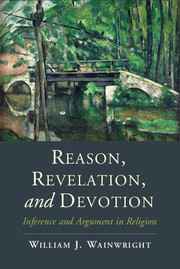Book contents
- Frontmatter
- Dedication
- Contents
- Acknowledgments
- Introduction
- 1 Four Examples of Religious Reasoning
- 2 The Purposes of Argument and the Person-Relativity of Proofs
- 3 Religious Reading and Theological Argument
- 4 Passional Reasoning
- 5 The Role of Rhetoric in Religious Argumentation
- 6 Reason, Revelation, and Religious Argumentation
- 7 Theology and Mystery
- Conclusion
- Notes
- Index
4 - Passional Reasoning
Published online by Cambridge University Press: 05 December 2015
- Frontmatter
- Dedication
- Contents
- Acknowledgments
- Introduction
- 1 Four Examples of Religious Reasoning
- 2 The Purposes of Argument and the Person-Relativity of Proofs
- 3 Religious Reading and Theological Argument
- 4 Passional Reasoning
- 5 The Role of Rhetoric in Religious Argumentation
- 6 Reason, Revelation, and Religious Argumentation
- 7 Theology and Mystery
- Conclusion
- Notes
- Index
Summary
In An Essay concerning Human Understanding, John Locke defined reason as “the discovery of the certainty or probability of such propositions or truths, which the mind arrives at by deduction made from such ideas, which he has got by the use of its natural faculties; viz. by sensation or reflection” (4.18.2). Rational belief is proportionate to the strength of the evidence at one's disposal. “The mind, if it will proceed rationally, ought to examine all the grounds of probability, and see how they make more or less for or against any proposition, before it assents to or dissents from it; and upon a due balancing of the whole, reject or receive it, with more or less firm assent, proportionably to the preponderancy of the greater ground of probability on one side or the other” (4.15.5). What is true of beliefs in general is true of religious beliefs. They are rational only if they are (1) properly basic (by being immediately grounded in the mind's intuitive awareness of its own ideas, for example), (2) inferred from those ideas by sound deductive or inductive reasoning, or (3) the content of a revelation whose credentials are certified by beliefs meeting the first or second condition. Although modern intellectuals may doubt whether religious beliefs meet these standards, Locke did not. God's existence can be demonstrated, and the evidence at our disposal makes it probable that the Bible is God's revelation,
Locke's view is sometimes called evidentialism. Evidentialism has much to be said for it. Like scientific beliefs, religious beliefs appear to be “evidence essential” – they are rationally held only if one is entitled to believe that someone in one's intellectual community has good evidence for them. (I am entitled to believe there are quarks, for example, but only because I have good reason to believe that physicists have evidence for them.) Religious beliefs are also controversial. Responsible inquirers have called them into question, and some doubts about them are not unreasonable. Under these conditions, one can appropriately be asked what entitles one to believe. The only entitlement that is likely to convince others of one's right to believe is good evidence. But finally (and most important), Christians, at least, have often assumed that there is good evidence for their position and that those who examine it without prejudice will be persuaded by it.
- Type
- Chapter
- Information
- Reason, Revelation, and DevotionInference and Argument in Religion, pp. 59 - 83Publisher: Cambridge University PressPrint publication year: 2015

